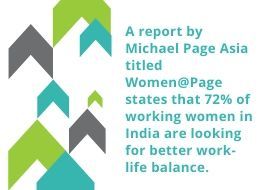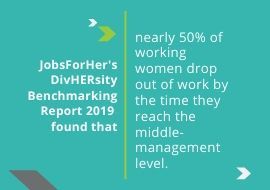Work-Life Balance: Why It’s So Important for Working Indian Women
- Namrata Harish
- in
- Career Development, Working Women, Talent Management
- |
- 13 Feb 2020

Hundreds of articles have been written to understand what work-life balance really means. The question arises whether it is especially important to working women, on whom the onus of family and child care falls, or if it is a universal need.
The fact of the matter is that work-life balance remains a sore point for companies that are looking to improve employee welfare and productivity.
If a balance between work and family life were quite easily achieved, there wouldn’t be tons of research on the topic every which way you could look. In fact, many scholars would be out of work!
What is it about these two domains of the human experience that make them polar opposites, while they still stand as foils to each other? And why is it that women often find themselves in No Man’s Land (figuratively, of course) between work and family life?

Work-Life Balance for Women
Working mothers face the keen edge of this sword — and it is a sharp one. The sting is felt when the woman is evaluated in either sphere for her worthiness.
Joan C Williams, founding director of the Center for WorkLife Law at the University of California’s Hastings College of the Law, found in her research that working mothers are rated less like businesswomen and more like housewives, and therefore, are considered not good for business.
This implies that women are expected to do only one or the other — devote herself completely to work or stay at home to care for her home and family. When she tries to do both, she’s seen as not being faithful to the space she’s in at that moment.
And research shows that women try to over-compensate in an effort to avoid misconceptions about her intentions. The Pew Research Center, in a global study on working parents, found that more working mothers than fathers felt they needed to reduce their work hours or turn down a promotion in trying to balance work and parenting responsibilities.
So, it becomes a balance between mothers’ guilt (where a woman feels guilty for abandoning her familial responsibilities, even if alternate arrangements have been made) and Imposter Syndrome (an inability to believe that her job is well-deserved and is the result of her own achievements. Women with Imposter Syndrome often feel like they’re being pitied or that someone else with no familial responsibilities deserves accolades at work).
A working woman/mother feels like she has to make the absolute choice or do a very fine job of tip-toeing along the see-saw to make sure there’s just the right balance across both sides.
Balancing Work and Family Is Good for Productivity
However, this balancing act is no child’s play. David Burkus, Associate Professor of Leadership and Innovation at Oral Roberts University, speaks of a “cognitive role transition” that takes place when you’re actively engaged in one role, but experience thoughts or feelings related to a different role. This can cause stress and deplete the energy and focus needed to perform your best.
So, this see-sawing takes away more than it gives — is it even worth it?
It is, as further research points out. The more role transitions you attempt, the less stressful they become. Let’s look at the positive influence great role models and family support have on our drive and productivity.

Finland has even contemplated implementing shorter and fewer work days to give working adults more time with loved ones or to pursue other interests. This comes after their own studies confirmed the need for breaks in between work to refresh the working mind.
Let’s examine work-life balance from the POV of the Indian workforce. Not only are our working women juggling a challenging career with a growing family, but they are also navigating through a minefield of societal sanctions.
Innumerable studies have recorded the drop-out rates of women who reach mid-career level.

This could be due to a change in priorities depending on their stage in life, but a large part of it is due to the lack of policies at the organisational level to meet the needs of working women looking for better work-life balance.
Sylvia Ann Hewlett, CEO of Hewlett Consulting Partners and Chair Emeritus of the Center for Talent Innovation, found in her research that an overwhelming 91% of Indian women who take a career break to care for family want to return to work.
At the same time, many women have difficulty juggling work and family obligations, and feel they receive neither support nor understanding from their employers.
Although many companies offer flexible work arrangements, more than half (54%) of women professionals believe they will be penalised if they choose that option. This means that they worry they won’t be considered for upper management and leadership positions because they will be seen as favouring family over work.
There is clearly a two-fold problem — ensuring that female employees are retained and nurtured to their productive best.
How Can Organisations Solve the Problem of Work-Life Balance?
- Organisations must consider work-life balance an imperative to women employee retention, right from the hiring stage
- Existing employees, hiring managers and reporting managers across the organisation must be educated about the pervasiveness of unconscious bias. Organisational policies should help eliminate that bias at all stages
- All employees, regardless of gender, should be encouraged to take up flexible work or any other policy offered by the organisation that promotes mental and physical health, and gives them time for family or creative pursuits
- Women trying to balance work and family life should be encouraged to let go of personal biases and apply for leadership positions. Having a mentor helps immensely
Every woman employee is a potential starting point for implementing policies for work-life balance. It’s a matter of understanding how important it is and making it a priority for your organisation’s success.
What policies does your organisation have in place to recognise and promote work-life balance? Tell us in the comments below and share this with all the people you know who are passionate about employee welfare and productivity.
Have suggestions on helping employees achieve work-life balance? Write to us at simran@jobsforher.com




